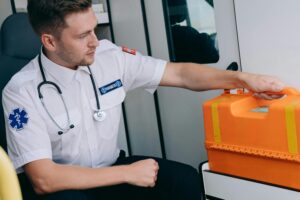When it comes to getting into a medical school, having the best GPA and MCAT scores don’t cut the bill alone. Highlighting your exceptional medical work experience and hospital shadowing projects in your personal statement can help you stand out from the crowd. Demonstrating your passion of pursuing a career in medicine and elaborating on previous work experience in a hospital, laboratory or research institute, is the best way to show to the medical school admissions committees how determined you are about the profession.
Deciding to pursue a career in a medical field is an arduous undertaking. Relevant work experience in a credible healthcare setting is the key to getting into a top medical university in Caribbean, since schools want to be sure that you have a clear idea about the challenging nature of the profession before they take you on-board. Having medical experience gives you plenty of opportunities to observe some of the skills required to become a brilliant physician. In addition, it helps you decide whether medicine is the right career choice for you.
Gaining experience in any medical field or healthcare setting would highly work in your favor. The more diverse your experience, the higher your chances of acceptance. If you are a prospective medical student and thinking of gaining some relevant work experience in an actual healthcare setting, here are a few options to help you learn how to deal with people in a real clinical environment.
1. Shadowing a GP
Working in a GP clinic can give you a chance to deal with a wide array of patients and diseases. You will also learn how to perform administrative tasks such as filing records, making and taking phone calls, reception work, dealing with prescriptions and a lot more. Remember, this is your first step in the realm of medical training; take it as a learning opportunity and accept whatever tasks you are entailed to complete.
2. Volunteering in a Hospital
Believe it or not, finding some volunteer work opportunities in a hospice can bolster your chances of gaining admission in a Caribbean school of medicine. You will definitely gain an invaluable learning experience. If you find an opportunity to work in a hospice, you will greatly benefit from direct patient contact, communicate with nurses, technicians, your co-volunteers, and families of patients. In addition, volunteering in a hospice helps you better understand how to deal with patients whose days are numbered and learn to control your nerves in a stressful condition. This will not only fortify your communication and clinical skills but better prepare you to deal with challenging and emotional situations.
3. Hospital Scribe
The medical scribe is a paid position in the emergency department that prospective medical students can pursue while in college or during a gap year. Working as a scribe is a great opportunity that allows you to gain more experience in a medically related environment, earning income to bear the cost of medical school in the Caribbean, and to pay off loans. Whether you want to be a physician or shadow one, becoming a scribe is a fantastic opportunity that offers one-on-one collaboration with a physician while giving you a real-life experience in a practice setting. As a scribe, you will be responsible for gathering information during the patient-doctor interview and update the information using a medical office electronic health record.
4. Working as an EMT
Finding a position as an emergency medical technician (EMT) is an effective way to gain some hands-on experience in a real healthcare setting. It gives aspiring physicians an opportunity to work as an entry-level healthcare provider and allows them to interact with patients and their families. As an EMT, you are exposed to a wide array of challenging medical conditions in various environments. You will learn basic life-saving skills and profound healthcare knowledge required to provide excellent patient care.
5. Working in a Youth Club
If you love working with kids and want to become a pediatrician, a children’s nurse or a speech and language therapist, consider gaining some hands-on experience. Luckily there are a huge number of volunteering opportunities that involve working with children. Prospective medical students can get relevant work experience in activity or youth clubs, local sports club, summer camps, after-school programs and more.
6. Working in Disability Centers
Working with disabled people is no easy feat. But undoubtedly, it is one of the most rewarding pieces of work you can do. Working as a caretaker in disability centers, rehabilitation centers, and old homes gives you first-hand experience with the types of challenges such patients face. It also nurtures an empathetic spirit which is essential to becoming a good medical student and a good doctor.
Over to You
No matter which option you choose to gain medical experience, having relevant work experience to pursue a career in medicine is crucial as it truly depicts that you are highly motivated and committed to the work you choose. Furthermore, it prepares you to work in the challenging medical field and develops an in-depth understanding of what the work involves. This is especially important when it comes to applying to a Caribbean medical school as admissions officers want you to show the depth of experience and your commitment to the profession. If you want to stand out in a crowded applicant pool, make sure you gain ample experience before taking the medical school plunge.







